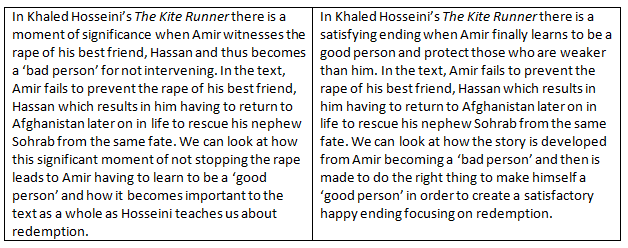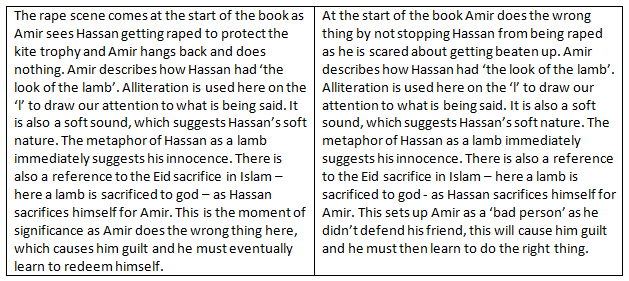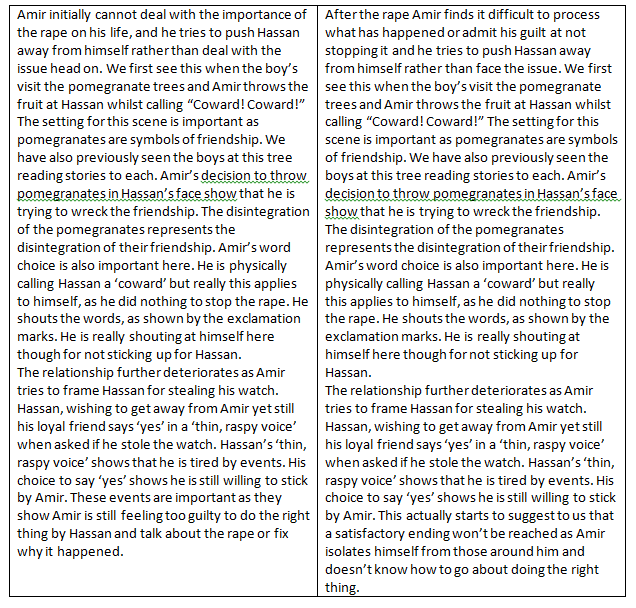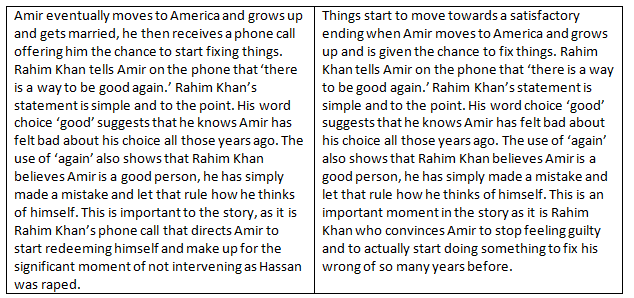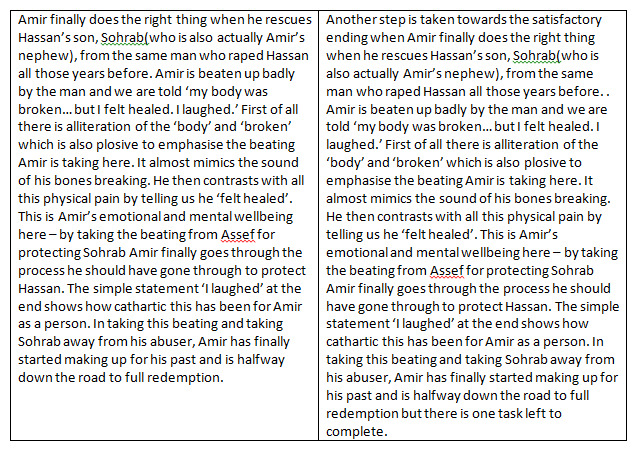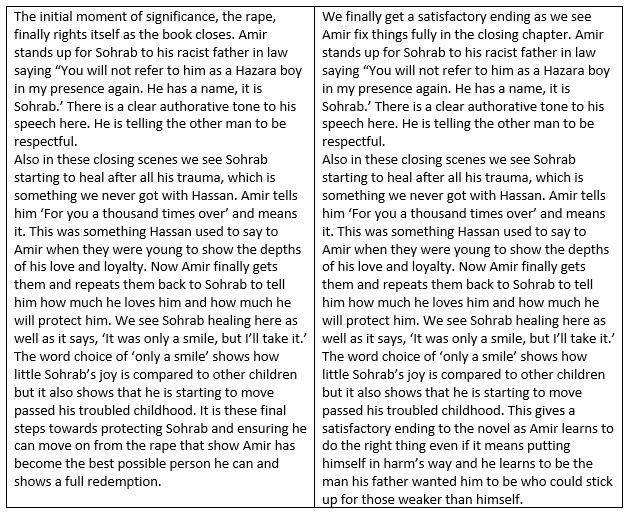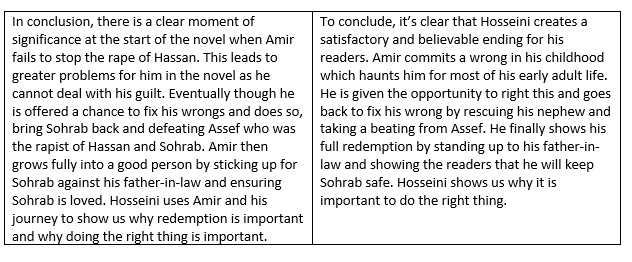-
The suspense of Chapter 4 is resolved as Pip does not receive the blame for stealing the pie. The militia enter and ask for help in making irons to catch the escaped convicts.
-
The Sergeant is very polite and upright. He says all the right things, although he says more than he has too.
-
The convict realises that Pip did not tell on him and cannot understand why he kept silent about him.
-
The two convicts are angry at one another because they were tried and convicted of the same crime. Convict 2 blames Convict 1 for being there, Convict 1 simply wants to harm Convict 2.
-
Joe says he was happy that the convict got food for his night on the marshes. This shows Joe is a caring person.
-
The reference to the ship as a ‘wicked Noah’s ark’ is because there are so many convicts packed onto the ship and instead of being taken somewhere nice they are going to do hard labour.
Tag Archives: prose
Great Expectations Chapter 3 & 4 notes
-
Pip meets another convict when he sets out to make his delivery who he thinks is the man employed to eat him.
-
It is surprising when Convict 1 reacts to the news of Convict 2 as it suggests there never was another man with him and Pip has been scared for no reason.
-
Mr Wopsle is the clerk for the church and he says that ‘Swine were the companions of the Prodigal (Jesus)’ Mr Wopsle says it to suggest there is something wrong with Pip. Dickens includes it to make a joke about Mr Wopsle eating pork whilst talking about pigs.
-
It is ironic that Mrs Joe does not attend church as she claims to be a devout Christian. She claims she does not attend so she can get more work done as Joe and Pip aren’t in the house.
-
Mrs Joe and Joe host Christmas dinner. They invite Mr Wopsle the church clerk, Mr Hubble the wheelwright and his wife, and also Mr Pumblechook who was a grain merchant and Joe’s uncle.
-
Mr Wopsle and Mr Pumblechook are both prideful and entitled men who have a lot to say without actually saying very much.
-
At this point in the novel it is suggested that Pip would become a blacksmith apprenticed to Joe.
-
Suspense is built at the end of Chapter 4 as Pip has stolen a pie to give to the convict which was to be presented as the pudding at Christmas dinner. He is now stressing about how he will not get the blame for his act of thievery.
Great Expectations Chapter 1 & 2 notes
-
When Great Expectations opens Pip is in the graveyard looking at his Mum and Dad’s gravestone.
-
Dickens hooks his reader immediately by having Pip attacked by an escaped convict.
-
Pip is afraid that if he doesn’t return with a file and food for the convict then he will be disembowelled by the convict’s friend.
-
Mrs Joe calls the stick ‘Tickler’ because she used it to hurt people rather than actually make them laugh. It shows she has a twisted sense of humour.
-
The story is told from Pip’s point of view. He is reflecting on his own history. This was unusual at the time as the majority of novels were written in the present tense with a third person voice – not in first person, past tense.
-
Pip is technically Joe’s brother-in-law, as Joe is married to Pip’s big sister. Joe and Mrs Joe are raising Pip, although Joe is more like Pip’s best friend.
-
There is physical comedy in Pip getting tipped over the gravestone, even though this is threatening behaviour from the convict. It is also physically funny when Pip is chased around the kitchen and Joe acts as his protector from Mrs Joe.
-
At the end of Chapter 2 Pip runs from the house to give the convict the stolen supplies on a very bleak morning. (dramatic epithet)
The Kite Runner sample essays
These are the 2017 Exam questions all answered. You can look at them side by side on the word document or paragraph by paragraph on the powerpoint.
You should be noticing by now that all the evidence and analysis is the same, give or take, and that the points and link backs are only changing depending on the requirements of the question but their overall idea is the same!!!
Critical Essay Writing
I know you guys think this is hard, and you think I’m mad when I say this is easy – but it really is! You do need to know all your quotes though, and it is SUPER important that you remember you essay structure. You are making an argument in your critical essay, a critical one, where you investigate and analyse the text. You should be making a clear POINT at the start of each paragraph, backing it up with clear EVIDENCE from the text, EXPLAINING how these quotes develop your point and finally LINKing it back to the main question.
This gives a minimum of four sentences in each paragraph of the essay. If you are sitting Higher, you should be putting in A LOT more analysis on your quotes. You should also be using more than one quote in some of your paragraphs. This will give you a PEEEEL structure in some of your paragraphs.
This sounds like a lot of work, but if you have selected your quotes carefully, then they are actually going to do most of the work for you.
Let’s take a closer look. We’re going to take The Kite Runner as our sample text. The 2018 Higher class have been studying this and they have chosen the following quotes:
1. ‘it was the look of the lamb’
2. ‘Coward! Coward!’
3. ‘in thin, raspy voice: ‘Yes.”
4. ‘There is a way to be good again’
5. ‘My body was broken… but I was healed. I laughed.’
6. ‘You will not refer to him as that Hazara boy in my presence again. He has a name and it is Sohrab.’
7. ‘It was only a smile, nothing more, but I’ll take it.’
8. ‘For you a thousand times over.’
That’s the quotes sorted out. Now we need to think about setting up an essay. Your introduction is important because it sets the scene. Take a look at these questions from the 2015 Higher paper:
4. Choose a novel or short story in which the method of narration is important. Outline briefly the writer’s method of narration and explain why you feel this method makes such a major contribution to your understanding of the text as a whole.
5. Choose a novel or short story in which there is a moment of significance for one of the characters. Explain briefly what the significant moment is and discuss, with reference to appropriate techniques, its significance to the text as a whole.
6. Choose a novel or short story which has a satisfying ending. Discuss to what extent the ending provides a successful conclusion to the text as a whole.
The first question is answerable but it’s not something we’ve focused on in class. Question 5 and 6 however are perfect for us. Take a look at the sample intro’s below. I’ve put them side by side so you can see how similar they are, and that we are simply tailoring our response to suit the actual question. Note how they use the same idea but tweak it to fit the question:
Now on to the first paragraph. We need to make clear our line of thought here, utilise our evidence and tie it back to the main argument of the text. Take a look at these two:
See how they use the exact same evidence and analysis? The POINT is more or less the same, but worded to suit the intent of the question, the same thing has happened with the link back to tie it in to the question.
Let’s take a look at the rest of both essays and see how the conclusion would work:
And that’s it!
(And yes, I am aware there are some grammatical and spelling errors in the above, but I think we can live with them for just now in the name of having Prelim revision materials!)
Essaying the Kite Runner
Now we’re going to try and write an essay. We’re going to take a look at question 1 again:
1. Choose a novel or short story in which there is a character who experiences rejection or isolation. With reference to appropriate techniques, explain the rejection or isolation, and discuss how this aspect adds to your appreciation of the text as a whole.
If this was your question and you’ve started off your essay by giving this intro:
In The Kite Runner by Khaled Hosseini there is a character Amir, who experiences isolation when he isolates himself because he experiences guilt at letting Hassan get raped. In the story Amir must make up for letting his best friend Hassan get raped by rescuing his nephew Sohrab from the Taliban. We can look at how Amir‘s isolation is important to our appreciation of the text as a whole by helping us understand that it is important to redeem yourself even if it is a hard thing to do.
Then we need to focus on Amir isolating himself and how this plays into the bigger theme of redemption. To begin with we’re going to note the POINTs when Amir isolates himself – the rape scene. Our next comment should be on how Amir goes on to isolate himself from Hassan, and then unwittingly from his father Baba. We can then begin to talk about how he comes back from this self-isolation by returning to Afghanistan at Rahim Khan’s request and rescuing his nephew. Then there is the sense of redemption at the end as he has finally managed to resolve things with Hassan’s memory. Our five points then would be something like:
1. Amir witnesses the rape and becomes guilty at Hassan’s sacrifice
2. He cannot deal with the rape and pushes Hassan away, attempting to fight him and eventually framing him
3. Rahim Khan explains that there is a way to be good again and he doesn’t need to be guilty anymore.
4. He gets Sohrab back and experiences a catharsis at finally confronting Assef.
5. He becomes the good man Baba wanted him to be and there is hope for Sohrab’s future.
Now, obviously that alone isn’t enough to write your whole essay. We will need to flesh this out with EVIDENCE from the text. What would we note down for these different sections? For each piece of EVIDENCE we need to explain how it is doing what it is doing. For a Higher essay some of our POINTs may have more than one piece of EVIDENCE which we will put in the same paragraph, or series of paragraphs. When we round off a paragraph we need to refer back to the question to show how that POINT is relevant. This is your LINK BACK. We’re going to put this plan together now:
PARAGRAPH 1:
P: Amir witnesses the rape and becomes guilty at Hassan’s sacrifice
E: “It was the look of the lamb”
Metaphor and alliteration to draw attention to what he is saying. The lamb is a symbol for Hassan. The lamb is sacrificed just like Hassan sacrifices himself for Amir and the kite trophy.
L: This event and the trauma of letting it happen is what causes Amir to isolate himself from those around him, especially Hassan who he feels he cannot face.
PARAGRPH 2:
P: He cannot deal with the rape and pushes Hassan away, attempting to fight him and eventually framing him.
E: “Coward! Coward!”
E: Speech that is shouted hence the exclamations. Amir calls Hassan a coward but really he is talking about himself. As he does this he throws pomegranates at Hassan. Pomegranates = friendship. Friendship is dead.
E: “Hassan’s reply was a single word, delivered in a thin, raspy voice: Yes”
E: Word choice thin raspy = Hassan’s low state. Yes = Hassan covering for Amir to get away from him.
L: Amir is incapable of processing or dealing with his guilt at what he has allowed to happen to Hassan and so he pushes him as far away as possible. This is what he will have to redeem in the future – the hurt he causes his best friend (and brother).
PARAGRAPH 3:
P: Rahim Khan explains that there is a way to be good again and he doesn’t need to be guilty anymore.
E: “There is a way to be good again”
E: instruction and challenge set by Rahim Khan. Idea that Amir was once a good person.
L: This phone call gives Amir the push he needs to leave his self-isolation and make things good.
PARAGRAPH 4:
P: He gets Sohrab back and experiences a catharsis at finally confronting Assef.
E: “My body was broken…but I felt healed. I laughed.”
E: Alliteration on ‘b’ and the plosiveness matches the sound of his bones breaking and so adds to the violence of the scene. The ellipses is to make us pause as he contrasts with his physical pain by telling us he was mentally relieved. He was ‘healed’ word choice tells us he was whole again. The ‘laughing’ shows us his relief.
L: Amir’s isolation was caused because he didn’t do the right thing the first time around. Now he does the right thing by preventing a rape and taking the beating he should have had in the first place.
PARAGRAPH 5:
P: He becomes the good man Baba wanted him to be and there is hope for Sohrab’s future showing complete redemption and becoming a good person.
E: You will not refer to him as ‘that Hazara boy’ in front of me again. He has a name and it is Sohrab
E: standing up to Soraya’s father. The words are words once used against Hassan. Amir is finally learning to be a good person.
E: For you a thousand times over
E: he can finally speak the words Hassan once said to him and mean them. That he is willing to do anything for someone else.
E: It was only a smile, nothing more… but I’ll take it.
E: The smile shows hope for Sohrab’s future, and their future as a family unit.
L: Amir has made things right and no longer has to feel isolated.
CONCLUSION:
The isolation was caused by Amir because he couldn’t handle his guilt. This lead to him having to redeem himself, something that Hosseini wanted us to think about. Amir eventually came out of his isolation at the request of Rahim Khan and he made things right by rescuing Sohrab.
Now attempt to write an essay using this plan.
The Kite Runner essay introductions
For those of you that missed it, here are the worksheets on The Kite Runner Higher essay introductions. One work sheet gives you the Prose exam questions and has some clozed introductions for you to have a go at. The other sheet has the example introductions to check yours against.
The Kite Runner All Chapter Questions and Notes
click to open the kite runner notes
Lord of the Flies – Essay plan mind maps & Questions
Lord of the Flies – Charcater essay on Ralph
Choose a novel with a character who you find interesting. With reference to the text show how the writer made the character interesting.
In The Lord of the Flies by William Golding Ralph is a very interesting character. In the novel a group of boys become stranded on a desert island and must fight to survive. Ralph is a compelling character because he is the one who fights to keep civility alive amongst the boys and tries to stop them becoming savages. We can track how he does this throughout the novel.
The first way Ralph proves to be interesting is when he establishes a sense of order on the island. He finds a large conch and gathers the boys together and tells them “I’ll give the conch to the next person to speak, they won’t be interrupted”. We can see clearly here that there is a sense of democracy, any boy who wishes to speak will be given the chance to do so. The idea that they won’t be ‘interrupted’ shows that Ralph expects the boys to listen to each other and give each other respect even if they don’t agree with one another. Ralph is also clearly the leader here as he is the one in charge of where the conch goes. This makes Ralph interesting as he is clearly the authority figure and he is clearly in charge at this point.
Ralph continues to exert his authority over the boys. The younger boys begin to slack off from their work and the older boys don’t pay attention to the fire and so Ralph shouts “I’m calling an assembly” and the boys immediately gather at the point. This shows that Ralph is still the boss at this point and it shows the boys still have a sense of civility as they conform to Ralph’s instructions. This is interesting because it shows Ralph is still able to control the boys at this point and there is still a sense of a functioning society.
Ralph sees that the boys are starting to move away from their civility as time passes and he tries to remind the boys of who they are. The older boys let the fire go out and Ralph, furious at them asks “Are we savages or what?” The tone of this is angry and he is trying to tell the boys that they need to behave better. The loss of fire is a loss of hope of rescue. Letting the fire go out suggests that some of the older boys aren’t actually fussed about getting off the island. This scene is interesting because it shows Ralph is starting to feel exhausted from being the only authority figure and he is getting frazzled at trying to get so many boys to conform to rules that will ultimately save them.
Ralph starts to lose his authority when Jack begins to openly challenge him. Jack punches Piggy and steals his glasses in order to restart the signal fire, Ralph calls him out on it saying “That was a dirty trick” and we are told “Ralph felt his lip twitch”. Ralph is openly identifying Jack’s deviant actions whereas in the past he would have let Jack away with it. He is trying to control Jack here. His lip twitching is an involuntary action but it betrays Ralph’s dislike for Jack. This scene is interesting as the group of boys can now see the split between Jack and Ralph and will be forced to take sides, and Ralph here actually looks weaker because he is not using brute strength.
Finally Ralph loses control of the boys completely but refuses to join them as he still clings to civility over savagery. When Simon is mistaken for the Beast and murdered Ralph is the only one who will admit “that was Simon, that was murder” and when they are finally rescued and the naval officer asks jokingly had they killed anyone Ralph responds “Only two” and Golding reveals “The officer knew when people were telling the truth. He whistled softly.” Ralph’s first statement is just that, a clear acknowledgement that the boys’ savage behaviour has led them to kill someone. Ralph’s response to the naval officer implies that the boys could have ended up killing more boys if rescue hadn’t occurred. Ralph is not scared of the truth. Ralph is interesting because he is the one boy on the island who has matured and grown a strong moral centre prizing civility over savagery.
In conclusion, Golding makes Ralph an interesting character by showing him grow as a leader and then remain the only boy who will not succumb to savagery by joining Jack’s group. Ralph is there to show us what could happen when savagery takes over from civility.

